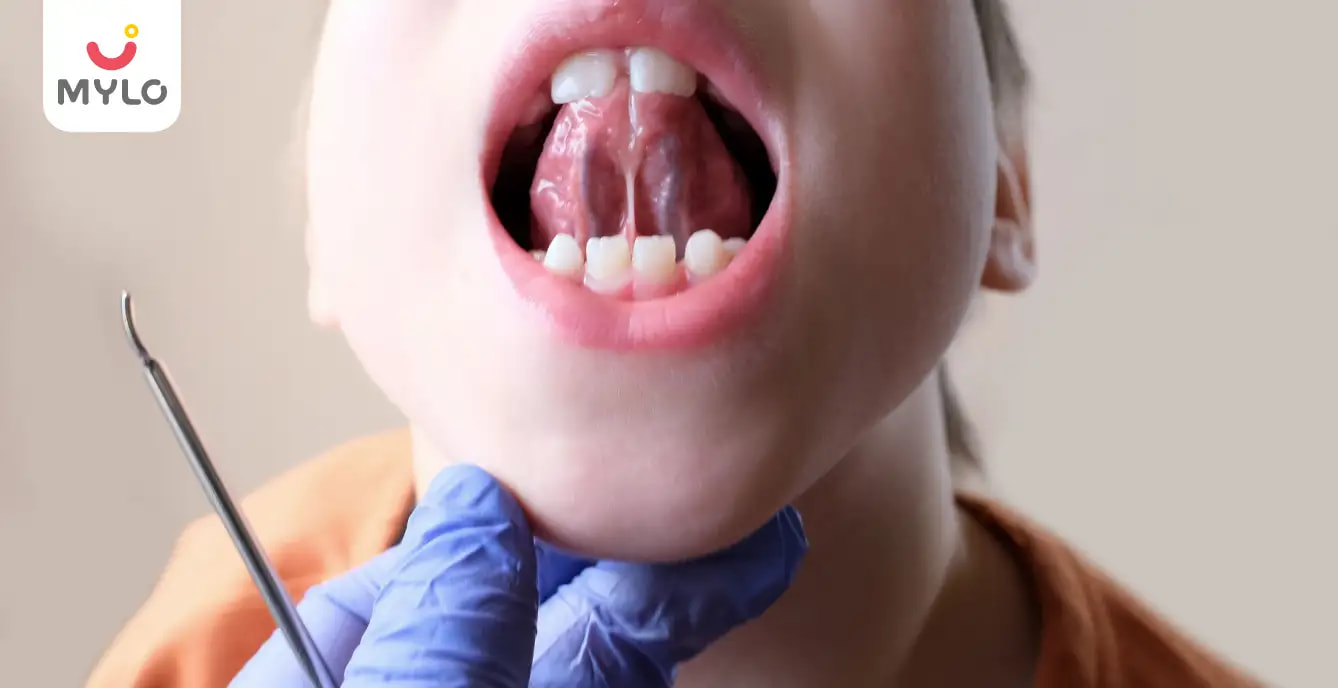Home

Tongue Tie: Meaning, Symptoms & Causes
In this Article

Baby Care
Tongue Tie: Meaning, Symptoms & Causes
Updated on 3 November 2023
Tongue tie is an actual oral condition that has several adverse effects on an individual besides just stumbling over words. There are various causes and symptoms of tongue tie.
Although the research is still in progress and evolving gradually to find its exact cause, tongue tie is still prevalent among newborn babies. Go through the below article to know what is tongue tie, its symptoms, and its causes.
What is a tongue tie?
Tongue tie, also known as ankyloglossia, is a disorder in which the tongue is persistently linked to the floor of the mouth. This happens when the lingual frenulum (the tiny strip of tissue that binds your tongue to the base of your mouth) is shorter than average. A small frenulum may limit the motion of your tongue.
Ankyloglossia is most prevalent in infants and young children, although it can also impact adults. It is related to breastfeeding issues and speaking problems. Tongue tie is a structural ailment, which means it is present from birth.
Tongue tie patients may have issues putting out their tongues. Tongue tie can also have an effect on how a youngster eats, talks, and swallows. In certain instances, a minor surgical operation may be required to resolve the problem.
What causes tongue tie?
What is tongue tie? What causes it? During fetal development, the tongue and the floor of the mouth join together. The tongue gradually separates from the base of the mouth. A thin strip of tissue (the lingual frenulum) eventually connects the bottom of the tongue to the floor of the mouth.
The little strip of tissue under the tongue diminishes and thins as a baby grows. The ring of tissues stays thick in kids with ankyloglossia, which makes it difficult to move the tongue.
Tongue tie is a congenital ailment, which means it is present from birth. It does not seem to grow after birth. The lingual frenulum will typically detach from the tongue before birth, allowing for a full motion range. However, tongue tie in newborns occurs when the frenulum remains linked to the tongue even after delivery. Nobody appears to understand why this happens.
According to certain hypotheses, tongue tie may occur due to hereditary factors. Some medical professionals believe that tongue tie only occurs in dysmorphic children and rarely in normal youngsters. Several newborns are impacted by this problem, which leads to further medical complications.
What are the symptoms of a tongue tie?
Tongue tie symptoms vary from mild to severe. Your child's tongue might just be heart-shaped or have a gap in it. Ankyloglossia is most often mild enough that symptoms do not impede daily life.
The symptoms of tongue tie in a newborn may result in:
● Lactation issues when nursing
● Nursing over long lengths of time
● Continuous hunger
● Experiencing difficulties gaining weight
● While your child is eating, you may sense a clicking sound
Tongue tie symptoms in young children may include:
● Speech difficulties with sounds that need your child's tongue hitting the roof of their mouth or the top front teeth. A tongue tie has no impact on the number of words your child has or says; it just affects their pronunciation.
● Experiencing trouble swallowing
● Difficulty moving their tongue from side to side or toward the top of their mouth
● Ice cream sucking is difficult
● Playing a musical instrument is difficult
● They have difficulty sticking their tongue out and up.
How is tongue tie treated?
Ankyloglossia is commonly detected in babies by a doctor or a lactation consultant.
The decision to cure a tongue tie in a newborn is frequently influenced by its intensity. For extremely mild cases, some health practitioners will propose a frenotomy (also known as a frenectomy), which is the operation performed to release the lingual frenulum. The most common adverse effect is mild bleeding.
While a frenotomy is often a straightforward surgery, parents or caregivers must gently stretch the tissue that has been cut, especially every day for at least 3 to 4 weeks later. During the recovery process, this prevents the tissue from reattaching too tightly. The stretches are not challenging, but most babies dislike them, making it difficult for parents. This approach is frequently chosen by parents who are experiencing problems breastfeeding their children.
Craniosacral therapy, lactation interventions, physical and occupational therapy, and oral motor therapy are all options if a frenotomy is not recommended for treating tongue ties.
How does tongue tie affect breastfeeding?
When breastfeeding, your infant must stretch their tongue over their jawline to form an adequate seal. This is not possible if your baby has a tongue tie. During breastfeeding, they frequently try to keep the nipple in their mouth by using their gums. This can be excruciating.
Newborn tongue ties can also interfere with latching because the tongue cannot stretch and elevate satisfactorily to latch onto the nipple and remove milk. Both discomfort and an inadequate latch caused by a tongue tie can result in decreased milk production, aerophagia (swallowing too much air), failure to thrive, or poor weight growth.



Written by
Parul Sachdeva
A globetrotter and a blogger by passion, Parul loves writing content. She has done M.Phil. in Journalism and Mass Communication and worked for more than 25 clients across Globe with a 100% job success rate. She has been associated with websites pertaining to parenting, travel, food, health & fitness and has also created SEO rich content for a variety of topics.
Read MoreGet baby's diet chart, and growth tips

Related Articles
Related Questions
Hello frnds..still no pain...doctor said head fix nhi hua hai..bt vagina me pain hai aur back pain bhi... anyone having same issues??

Kon kon c chije aisi hai jo pregnancy mei gas acidity jalan karti hain... Koi btayega plz bcz mujhe aksar khane ke baad hi samagh aata hai ki is chij se gas acidity jalan ho gyi hai. Please share your knowledge

I am 13 week pregnancy. Anyone having Storione-xt tablet. It better to have morning or night ???

Hlo to be moms....i hv a query...in my 9.5 wk i feel body joint pain like in ankle, knee, wrist, shoulder, toes....pain intensity is high...i cnt sleep....what should i do pls help....cn i cosult my doc.

Influenza and boostrix injection kisiko laga hai kya 8 month pregnancy me and q lagta hai ye plz reply me

Related Topics
RECENTLY PUBLISHED ARTICLES
our most recent articles

Diet & Nutrition
গর্ভাবস্থায় আলুবোখরা: উপকারিতা ও ঝুঁকি | Prunes During Pregnancy: Benefits & Risks in Bengali

Diet & Nutrition
গর্ভাবস্থায় হিং | ঝুঁকি, সুবিধা এবং অন্যান্য চিকিৎসা | Hing During Pregnancy | Risks, Benefits & Other Treatments in Bengali

Women Specific Issues
স্তনের উপর সাদা দাগ: লক্ষণ, কারণ এবং চিকিৎসা | White Spots on Nipple: Causes, Symptoms, and Treatments in Bengali

Diet & Nutrition
গর্ভাবস্থায় পোহা: উপকারিতা, ধরণ এবং রেসিপি | Poha During Pregnancy: Benefits, Types & Recipes in Bengali

Diet & Nutrition
গর্ভাবস্থায় মাছ: উপকারিতা এবং ঝুঁকি | Fish In Pregnancy: Benefits and Risks in Bengali

Diet & Nutrition
গর্ভাবস্থায় রেড ওয়াইন: পার্শ্ব প্রতিক্রিয়া এবং নির্দেশিকা | Red Wine During Pregnancy: Side Effects & Guidelines in Bengali
- ইনার থাই চ্যাফিং: কারণ, উপসর্গ এবং চিকিৎসা | Inner Thigh Chafing: Causes, Symptoms & Treatment in Bengali
- গর্ভাবস্থায় ব্রাউন রাইস: উপকারিতা ও সতর্কতা | Brown Rice During Pregnancy: Benefits & Precautions in Bengali
- Velamentous Cord Insertion - Precautions, Results & Safety
- Unlock the Secret to Flawless Skin: 7 Must-Have Qualities in a Face Serum
- Unlock the Secret to Radiant Skin: How Vitamin C Serum Can Transform Your Complexion
- Gender No Bar: 10 Reasons Why Everyone Needs a Body Lotion
- Unlock the Secret to Radiant Skin How to Choose the Perfect Body Lotion for Your Skin Type
- Top 10 Reasons to Apply a Body Lotion After Every Bath
- Communication in Toddlers: Milestones & Activities
- How to Improve Vocabulary for Toddlers?
- A Comprehensive Guide to Understanding Placenta Accreta
- Vulvovaginitis in Toddlers Causes, Symptoms and Treatment
- A Comprehensive Guide to Understanding Cerebral Palsy in Children
- Bitter Taste in Mouth During Pregnancy: Understanding the Causes and Remedies


AWARDS AND RECOGNITION

Mylo wins Forbes D2C Disruptor award

Mylo wins The Economic Times Promising Brands 2022
AS SEEN IN

- Mylo Care: Effective and science-backed personal care and wellness solutions for a joyful you.
- Mylo Baby: Science-backed, gentle and effective personal care & hygiene range for your little one.
- Mylo Community: Trusted and empathetic community of 10mn+ parents and experts.
Product Categories
baby carrier | baby soap | baby wipes | stretch marks cream | baby cream | baby shampoo | baby massage oil | baby hair oil | stretch marks oil | baby body wash | baby powder | baby lotion | diaper rash cream | newborn diapers | teether | baby kajal | baby diapers | cloth diapers |




